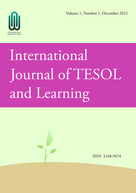


Volume 11 Issues 1-4 (2022-12-31)
Volume 10 Issues 3&4 (2021-12-31)
Volume 10 Issues 1&2 (2021-06-30)
Volume 9 Issues 3&4 (2020-12-31)
Volume 9 Issues 1&2 (2020-06-30)
Volume 7 Issues 3&4 (2018-12-31)
Volume 6 Issues 3&4 (2017-12-31)
Volume 6 Issues 1&2 (2017-06-30)
Volume 5 Issues 1&2 (2016-06-30)
Across the globe, from the very wealthy continents of North America to Europe to Australia, the phenomenon of migrant and immigrant students outperforming native students are observed and documented. Even within the same race, achievement differences are being observed. What might account for the achievement success of one group of students over the other group? Are achievement differences among the migrant and non-migrant groups linked to only family dynamics or to socio-cultural or to psychological factors? Ogbu’s (1998) Cultural-Ecological Model appears to be insufficient in completely and effectively accounting for these achievement differences. Therefore, the author is proposing a more omprehensive, “Interdisciplinary Theoretical Model of Migrant Schooling” to effectively account for the achievement differences seen across the globe.
This study examined teacher-student conferences and the students’ perception of their writing. Students were surveyed and interviewed before, during and after the study to compare their perception of their writing. The students and the teacher-researcher met face to face twice a week and collaborated together on discussing the student’s writing mechanics and usage. The method involved two, adult English Language Learner students and the teacher-researcher working together to discuss the expectations, goals, and writing criteria used throughout the study. This study concluded that by using the teacher-student conference, the students’ perception of their writing improved. This resulted in the students having more confidence because they had someone to assist with questions and to provide suggestions concerning the needs of the ELL students.